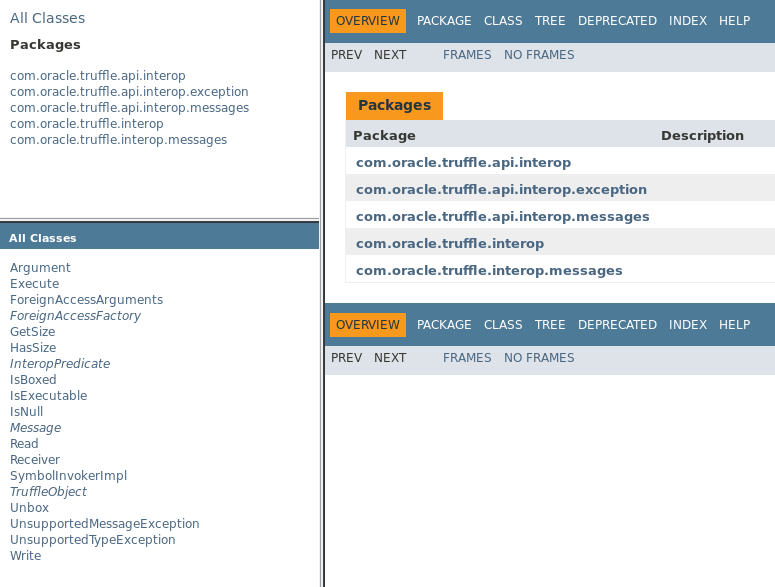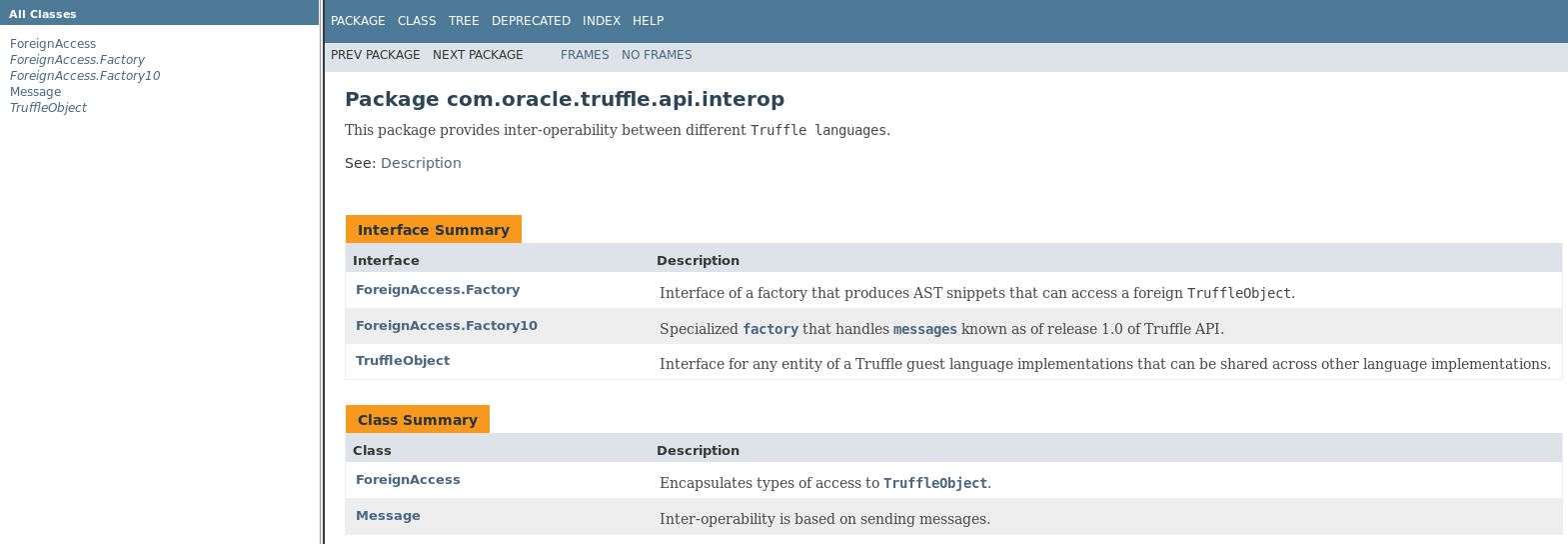TwoYearsWithTruffle
From APIDesign
In May 2015, when I joined OracleLabs and got a task to turn Truffle from a research system for writing fast AST interpreters into an industry ready framework, I wrote an essay called Domain Expert - asking whether one can design API as a service or whether one has to be a Domain Expert when designing an API. I feel it is a time for reflection and time to describe how my attempts to design as a service ended up.
Contents |
Polyglot Beginnings
One of the unique features of Truffle is its polyglot nature. The ability to freely mix languages like JavaScript, Ruby or R at full speed (as demonstrated by my sieve project) is clearly amazing. Most of that had already been written and published by Matthias Grimmer - when I joined, I just got a task to polish it into a formal API - exactly aligned with the vision of design as a service. Matthias had done a lot of work - he was able to run benchmarks written in all of the three scripting languages and also mix them with his own interpreter of C. That meant there was a lot of tests to run - just booting up the languages was complicated. Every language needed its own proprietary setup.
It was clear what I had to do: design a system of registering Truffle languages in a declarative way and initializing them in a uniform style. That was great, as my previous NetBeans_Runtime_Container API experience was all about registering and discovery of some services.
I just had to decide whether it is better to fit into an existing standards API - e.g. ScriptEngine - or whether it is better to design something from scratch. The dilemma is always the same - is it better to follow the standard and compromise on the things that don't fit in there (in the case mostly polyglot features) or design a new API that would match our needs 100%? Given the fact that polyglot features were the most important selling point, I went for a new API. That was probably good choice, but the missing support for ScriptEngine is still biting us from time to time and there is an open issue to address it.
Anyway TruffleLanguage and PolyglotEngine were created and all Matthias's interop tests could be rewritten to use just these API and don't talk to each language directly. Good example that design as a service can work.
Testing Compatibility
Another thing that was more or less obvious was the need for compatibility between languages. There are two approaches to tackle that:
- testing from bottom
- testing from the top
Testing from the top simply means to write sample programs that mix and match languages and assert some output. Again the sieve project contains examples of that approach. However this can only test the languages one knows about (e.g. one is on top the chain of dependencies and knows them all). Thus it is a lot of work and the coverage isn't equally distributed among all languages.
Thus I prefer testing from bottom: one writes a test compatibility kit (a TCK) that contains abstract test definitions with tasks that each language author needs to finish by writing suitable code snippet in own language to perform the given task. This approach scales much better and gives consistent coverage across all language implementations. Each time we detect a deviation from the expected polyglot behavior and add a test to TruffleTCK the language writers are notified and can implement the desirable functionality.
I'd say this part of my Truffle work went fine even I still wasn't a Truffle Domain Expert.
Polishing Interop
Truffle polyglot capabilities are based on so called interop API also created by Matthias. My task was to polish it. That required me to gain some Domain Expert knowledge, but not that much as the interop is a kind of isolated part of Truffle system that can be (to some extent) understood on its own. Moreover most of the work was in applying abstractions and hiding stuff that didn't have to be exposed as an API. Compare the original version
with the polished one. Instead of almost twenty classes split into five packages, there are just five classes in a single package. Just these five abstractions were enough to provide the same functionality - this is the kind of service you can expect when asking someone to design API as a service.
I was so proud of my result that I even talked about it at a conference speech. Matthias was listening and told me that he felt ashamed. But there was no need - I have kept 99% of original Matthias code - I just hide it. API should be like a facade - it should hide the gory details of implementation in order to help users to stay clueless and still be productive. There is no need to be ashamed, we should be all proud.
Of course over the next months we added more classes into the interop package to support exception handling, simplify writing of boiler plate code when resolving interop messages, etc. However it is always better to start with some smaller API and later expand it than trying to do it the opposite way.
Debugger
The Truffle team master of debugger related tasks was Michael Van De Vanter - author of revolutionary article Debugging at Full Speed and many others. Michael had an implementation of debugger for Truffle implementation of Ruby and JavaScript running and also the implementation for R was sort of working. However the situation was similar to Matthias polyglot attempts - each language needed its own setup to turn the [[debugger] on. In addition to that the way to start normal execution - e.g. via PolyglotEngine - was different than the way to start debugging. As a result one needed to decide ahead of time whether debugging will be needed or one wants just a plain execution. Of course this had to be unified.
After a bit of struggling I managed to reverse the dependency - e.g. one could always start the execution with PolyglotEngine and, if the debugger was initialized, debugging started automatically. Moreover I added few hooks that could be triggered via JPDA debugger protocol and then Martin Entlicher (the NetBeans debugger guy) could implement TruffleNetBeansDebugger. Since then NetBeans became able to debug any Truffle based language, step through the sources (even without the IDE understanding them), see stack variable, etc.
Of course the behavior was buggy and had to be tested. I was thinking of putting the test into TruffleTCK, but except one trivial case (using debugger to kill long running execution) the tests seemed too language specific to be tested from bottom. Thus I created SLDebugTest which verified that stepping over a factorial computation works, shows good values for local variables, etc. and asked other teams to copy the test and adopt it to their language. As far as I can tell then the consistency of debugger implementations increased.
This all was achievable without Domain Expert knowledge of Truffle. However there were few problems that had to be addressed:
- The AST instrumentation API was found ineffective and real Truffle AST expert, Christian Humer had to be called to rewrite that
- Initial evaluation (that talked to a debugger) was slow - after weeks of struggling and help from Christian I finally learned enough about partial evaluation tricks to speed it up
- Debugger could only be attached when new PolyglotEngine was about to start - again, it needed Christian's new instrumentation API to fix that up
These problems show the limits of API design as a service - designing an API worked, but making it fast required a lot of understanding of what happens under the cover.
API cleanup + Tests + NetBeans by Martin E.
attach by ChH.
Source API
cleanup of source API, making everything immutable, including whining builders, etc.
Sigtest
Javadoc and Codesnippet Doclet
Jackpot
- JDK8, but no lambdas
- automatic rewrites of deprecated APIs.
Tutorial as an entry point to Javadoc
Node.js & Java Interop
Typesafe view of a dynamic object via interface.
Cleaning up classpath with TruffleLocator.



